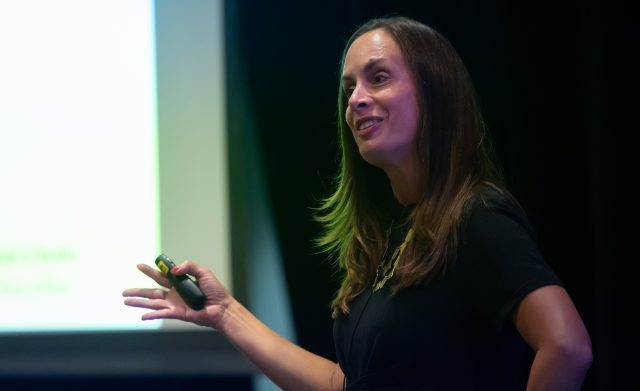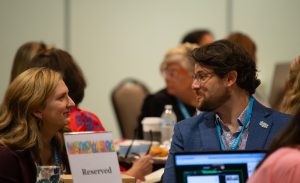
Nadine Gaab, associate professor in the Harvard University Graduate School of Education, speaks to attendees at the Understanding Early Literacy Conference at the Oxford Conference Center. The daylong event was sponsored by the North Mississippi Literacy Project, UM School of Applied Sciences, Mississippi Education Consortium, Shelton School and Lafayette County School District. Photo by Kevin Bain/Ole Miss Digital Imaging Services
OXFORD, Miss. – “The development of reading proficiency is a public health issue.” That was the message shared by renowned researcher Nadine Gaab during a daylong conference on early childhood literacy hosted Saturday (Sept. 23) by the University of Mississippi.
Gaab, associate professor of education at the Harvard University Graduate School of Education, delivered the first of three keynote addresses to more than 100 professionals who attended the Understanding Early Literacy Conference. She stressed the importance of early intervention as a means of curbing later learning disabilities, such as dyslexia.
“Reading development starts in utero, but learning to read is not a natural process,” Gaab said. “We must recognize the science of reading and become proactive as children make the shift from learning to read to reading to learn.”
Research has shown that children with learning disabilities have an increased risk for negative psychosocial outcomes, Gaab said.
“Struggling readers are four times as likely to drop out of school,” she said. “We need to embrace literacy as a community, involving not just teachers and parents, but libraries, pediatricians and social workers as well.”
Eric Tridas, another keynote speaker, is a developmental and behavioral pediatrician and the International Dyslexia Association representative to the National Joint Committee on Learning Disabilities. He stressed that interventions can be provided early and protect from literacy challenges.
“We can prevent learning impairments from becoming disorders in learning, written expression and mathematics,” he said. “Kids aren’t going to outgrow their impairments, but they can learn early how to manage them.”
When it comes to intervention, pediatricians have several advantages, Tridas said.
“We have followed the children since birth, are familiar with the screening instrument, know the early indicators and are willing to help at very little costs,” he said. “Let’s not wait! We can prevent these problems.”

John Hodges (right), director of the North Mississippi Literacy Project, shares information about the program with a participant at the Understanding Early Literacy Conference. Photo by Kevin Bain/Ole Miss Digital Imaging Services
Tim Odegard, professor of psychology and holder of the Katherine Davis Murfree Chair of Excellence in Dyslexic Studies at Middle Tennessee State University, talked about dispelling myths around dyslexia. These myths include:
- Dyslexia reflects a lack of intelligence
- Dyslexic people are lazy
- Dyslexia is something that children will outgrow
Noting that October is National Dyslexia Awareness Month, Odegard, who is dyslexic, challenged those who may have dyslexia to “come out of the cave, shatter the myths and live the reality.”
“I am living proof that dyslexic people are not dumb, lazy or no longer dyslexic,” he added.
A panel featuring literacy experts, including Kenya Wolf, UM associate professor of early childhood education, discussed efforts to improve literacy in the state.
Joyce Pickering, executive director emerita of the Shelton School in Dallas, said that if attendees were informed and encouraged by the presentations, then the conference was a success.
“This conference was about seeing the difference in learning in children pre-K to third grade and helping them,” Pickering said. “We hope you are able to take the information you have learned to better children’s futures.”
The meeting, held at the Oxford Conference Center, was funded by a donation from Carol Dorsey, of Tuscon, Arizona, wife of former Ole Miss economics professor Bob Dorsey. The conference was created by the North Mississippi Literacy Project, which is in its third year of working with the Lafayette County School District.
John Hodges, a member of the Shelton School staff, moved to Oxford to direct this three-year research project for early literacy. The research is showing positive results, as reported by Vishakha Rawool, lead researcher on the project and research director in the UM Department of Communication Sciences and Disorders.
Co-sponsors include UM School of Applied Sciences, North Mississippi Education Consortium, Shelton School and Lafayette County School District.
Mississippi, which previously ranked among the worst states in the country in early childhood literacy, boasts literacy rates higher than the national average.